Science & Technology _|_ Issue 16, 2020
The Future Prospects for Humanity
Professor Martin Rees, the Astronomer Royal, talks about the threats to our survival in the 21st century, and the need for a cosmic perspective


The Future Prospects for Humanity
Professor Martin Rees, the Astronomer Royal, talks about the threats to our survival in the 21st century, and explains why we need to take long view of human life
Lord Martin Rees has had a long and distinguished career in the field of astrophysics. Known for his work on cosmic microwave background radiation and galaxy formation, he was Director of the Institute of Astronomy at Cambridge University, and from 2005–10 President of the Royal Society. He has written several books for the general public on the extraordinary new view of the universe which has emerged in the last fifty years, including Our Cosmic Habitat (2001). [1] He has also been vociferous in his concern for wider social and political issues, particularly climate change, and is a founder member of the Centre for the Study of Existential Risk at Cambridge University, which studies possible extinction-level threats stemming from technology. His latest book, On the Future Prospects for Humanity (2018), [2] lays out his hopes and fears for us in the twenty-first century. Jane Clark and David Hornsby talked to him at his house in Cambridge via Zoom.
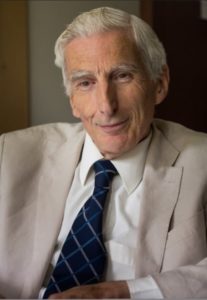 David: It would take the whole of our time to list the many honours that you hold, and the distinguished committees on which you sit. But may I just ask you about one of your titles – that of Astronomer Royal – which you have held for 25 years now. Can you tell us what that means?
David: It would take the whole of our time to list the many honours that you hold, and the distinguished committees on which you sit. But may I just ask you about one of your titles – that of Astronomer Royal – which you have held for 25 years now. Can you tell us what that means?
Martin: People sometimes ask me whether I do the Queen’s horoscopes but I have to say no, because I am not an astrologer. Scientists are rotten forecasters – almost as bad as economists! The post was established in 1675 and the title was given to the person who ran the Royal Greenwich Observatory. This became a museum in the 1960s when it was no longer used for observation because it had become possible to put telescopes under clear skies in places such as Hawaii and the Canary Islands. But the title ‘Astronomer Royal’ has been retained, and is now given to a senior academic astronomer in the UK. Actually, it’s purely honorary. I like to say that the duties are so exiguous I could perform them posthumously.
Jane: In your book On The Future, you state your belief that the 21st century is a crucial one for humankind. The reason for this is that we are now fully into the age of the ‘anthropocene’, in which we, as the human race, have the power to change the biosphere in significant ways. As a consequence, you feel that we are facing major threats to our continuing survival.
Martin: I actually think that it is most unlikely that humanity will wipe itself out completely, but I do think that we will have a bumpy ride through this century. We are facing enormous challenges.
Jane: You list two main areas of concern. One is climate change, and the other is what you call ‘existential threats’ – things such as nuclear war and problems with our global infrastructure, biological attacks and so on. We are now living through one of these threats in the form of a global pandemic. What are we learning from that?
Martin: The pandemic has been a wake-up call for the public and politicians. One of my maxims is: ‘the unfamiliar is not the same as the improbable’, and although this was a different kind of pandemic from the one the government was prepared for – which was another influenza pandemic – we should have realised it was not that unlikely. There had been SARS and MERS before.
So, one lesson we should learn is that it’s worth doing more preparation to cope with potential disasters of the kind that have not yet happened. I think the public and politicians will realise that we are vulnerable to further pandemics – in the future maybe even to ones which are engineered rather than naturally occurring – and also to other catastrophes which could lead to a breakdown of civilisation. These longer term global issues are hard for politicians to prioritise over and above the urgent and immediate parochial issues which their constituents care about, but my hope is that they will rise higher up the agenda.
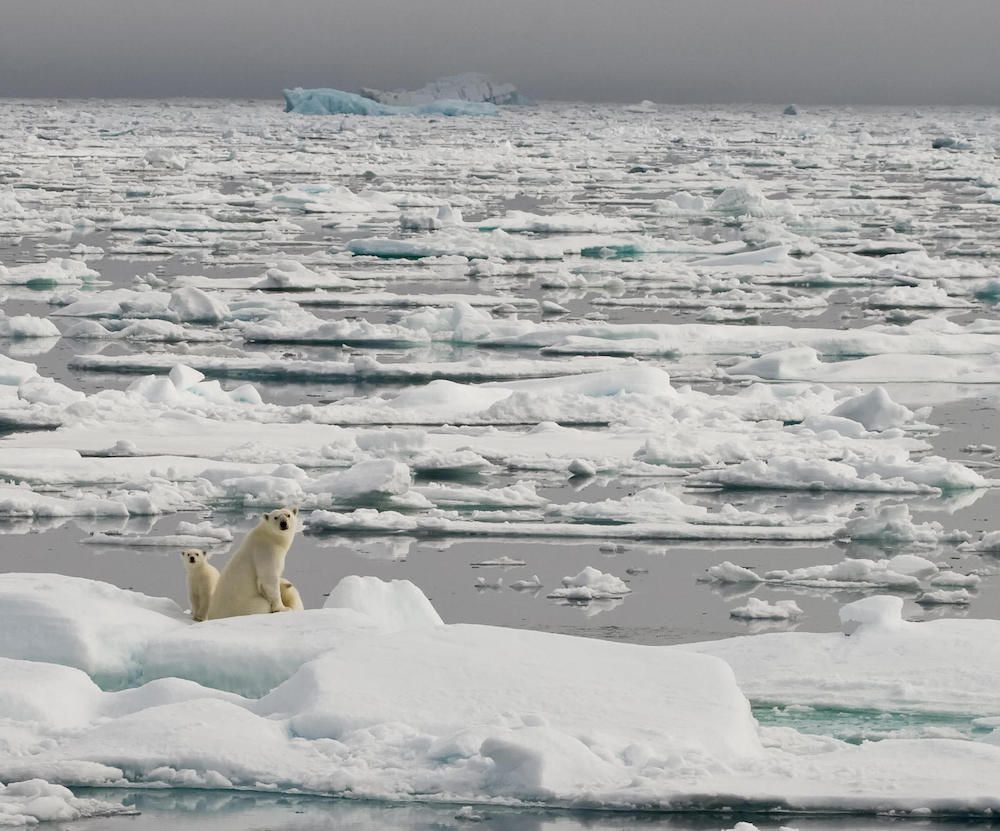
Polar Bears on the melting icecap, Svalbard Archipelago. According to the latest research, icecaps are melting faster then they have for 12,000 years, leading to potentially harmful rise in sea levels. For more, click here [/]. Photograph: andrew chastney / Alamy Stock Photo
Future Scenarios
.
David: What are your major areas of concern?
Martin: One factor is that everything is potentially aggravated by the whole world being in such a high degree of communication. What is more, travel is rapid, so any catastrophe in one part of the world, in one continent, will cascade globally in a way that did not happen in the past. We have seen this with Covid-19.
Another reason for concern, particularly in terms of social disruption, is that expectations are high. We live in a comfortable world. If we contrast the situation now with the 14th century when the Black Death – the bubonic plague – killed half the population of many towns in Europe, then the people who survived just carried on fatalistically because they felt that there was nothing they could do. Whereas now, if we had a pandemic which killed even one percent of the population, that would overwhelm hospitals and there would be a breakdown of social order because of a clamour for a treatment that wasn’t there. I think we would cope less well with a pandemic with a high fatality rate than we have with the present situation.
Another kind of concern is that there might be some kind of breakdown in the electricity grid. Lights going out is the least of the problems; we depend so much on electricity that if it failed for even a few days – through some design fault or through a cyber attack – that would lead to complete anarchy in the region affected. I quote in my book a report from the American Defense Department, saying that a cyber attack on the eastern United States’ electricity grid would merit a nuclear response. They say clearly that they would regard this as serious as a nuclear war.
So we have these scenarios where our vulnerability is great and our expectations are high, and this means that society’s coherence is more fragile than it was in the past.
Jane: You call yourself a techno-optimist, meaning that you think that many of our problems such as climate change and feeding the population can be solved through technology. But you are politically a pessimist because you don’t see politicians and governments responding coherently enough, or rapidly enough, to the long-term situation.
Martin: If we continue the comparison with the Middle Ages, it’s fairly clear that, owing to technology of all kinds, we lead a better life on average than our medieval forebears did. Also the population of the world now is much higher and couldn’t be fed at all had it not been for all the advances in agriculture and such like. But there has not been comparable ethical progress. In the 14th century things were pretty grim for most people, but there was not much they could do about it. Whereas now, although the average quality of life has gone up, the potential quality of life has gone up even more, so there’s a bigger gap between the way things are and the way they could be. And this is an ethical indictment, in my opinion. To take one example: the richest two thousand people in the world would have the resources to double the income of the bottom billion – but they’re not doing this.
However, this is just a preface to another really important problem, which is climate change. This is an especially difficult one to persuade politicians to engage with, because the main effects are decades in the future. Also, they’ll be worse in other parts of the world than they are in the UK, or Europe and America. It’s hard for politicians to use up their capital, as it were, on the welfare of people far in the future and far away in space. In the book I quote Jean-Claude Juncker, who says that politicians know the right thing to do, but they don’t know how to get re-elected if they do it. So we’re up against that.
Jane: Although you do think that there are some encouraging signs that governments will act if they perceive that public opinion is behind them?
Martin: Yes. One example is the Papal Encyclical in 2015, which was scientifically informed by the Papal Academy of Sciences, of which I am a council member. That encyclical, Laudato Si, [/] subtitled ‘On Care for Our Common Home’, [3] got the Pope a standing ovation at the UN, and had a genuine impact on his billion followers, mainly in Latin America and East Asia. That eased the path towards the consensus at the climate conference in December of that year. Whatever one thinks of the Catholic Church, one can’t deny its long-term vision, its global reach and its concern for the world’s poor. And that’s an example where opinion, both of political leaders and the public, was influenced by a charismatic and globally respected figure.
On a slightly smaller scale, in this country we have the influence of our ‘secular pope’, David Attenborough, whose television programmes have done so much to draw peoples’ attention to the problems of the natural world. In his series ‘Blue Planet II’ there was an image of an albatross returning to its nest and coughing up not the longed-for nourishment for its young but bits of plastic. That was an iconic image and put the issue of plastic contamination of the ocean on the public agenda. This laid the ground for Michael Gove, who one does not really think of as an idealistic politician, when he was Minister for the Environment a few years ago, to introduce legislation to ban non-reusable – plastic – drinking straws, because he felt he could do this without losing votes.

Sir David Attenborough, whose BBC series Blue Planet II in 2019 brought the attention of a wide public to the effects of plastic waste upon birdlife. Photograph: BBC
Stewardship of the Earth
.
Jane: David Attenborough has been particularly concerned lately to draw our attention to the massive extinction of species which human activity is causing. This is something that you have also talked about as a tragedy, and you bring in the idea of stewardship – the notion that human beings have a duty of care towards the natural world. Stewardship is a fundamentally religious idea – it is based on the understanding that we are given the task of looking after the earth by God – whereas you, as I understand it, would describe yourself as an atheist.
Martin: I’d question your statement that stewardship is just a religious idea. I see it as something which many people like myself, who can’t accept any religious dogma, believe very strongly. This is one context where being an astronomer may give a special perspective. Most people are now comfortable with the idea that we are the outcome of four billion years of Darwinian evolution but they nonetheless tend to assume that we are the culmination of the process. Whereas astronomers know that our potential future is at least as long as the past, so we could have several billion years still to go.
That makes this century even more crucial, because we can hand on to our remote descendants a flourishing planet and humans who may evolve into beings who are even more marvellous; or we could, by misadventure or ill intent, leave an impoverished world where all this amazing billion-year future is foreclosed. A cosmic perspective is something which enhances not only our sense of mystery and wonder at the universe, but it also gives a special reason why we don’t want to foreclose it.
This perspective is in absolute contrast with that of some American fundamentalists, who say that we might as well use up the whales or the redwoods now because in 50 years time the ‘rapture’ will occur, when all the people who really matter will be taken out of this world. These people think that everything is there for us to dispose of as we wish, only seeing a few decades into the future, whereas a scientific perspective sees that we are part of a grand, ongoing process which has much further to go.
Jane: There is rather a tendency within some wings of the ecological movement to blame modern western science for all our problems. But you believe that a scientific point of view actually leads to a greater cherishing of life and of our bio-systems.
Martin: The more one learns of science, the more one is impressed by the mystery and wonder of nature. Even the simplest insect is far more complicated and wonderful than an atom or a star; just think of the amazing stages of chemical reactions that must happen every time a fly flaps its wings. The more we learn, the more astonishing it is that the world has emerged with all this beauty and wonder. And so, naturally, we want to preserve it.

Dragon fly on stone wall. The way in which these insects use their four sets of wings is highly complex and not fully understood. For more, click here [/]. Photograph: MPSPhotography / Alamy Stock Photo
Science and Religion
.
Jane: At the other end of the scale, you have critiqued the views of what you call hard line atheists within science, who maintain that science and religion are in opposition. Do you believe that this is an area where we should exercise tolerance?
Martin: Yes. I have particularly objected to Richard Dawkins, who I think has done more harm than good by regarding religion as an enemy. I can give two simple reasons. One is that I think most reasonable people – whether they have a religious belief or not – would agree that religious fundamentalism is a danger to the world. In that respect, most atheists are aligned with most religious people and it is counter-productive to be attacking one another. We need all the allies we can get to deal with fundamentalism.
Secondly, if I was a teacher in a sixth form which had students with a religious belief – people of the Muslim faith, for instance – and I were to tell them that they cannot have both their God and science, they would most likely stick with their God and be lost to science. And that would be sad and quite unnecessary. My own view is that although there are clearly some religious people who believe things which are contrary to science – creationism for instance – there are many good scientists who are also religious. You can’t dismiss all people who have religious beliefs as naive or stupid.
Jane: When I asked my daughter, who is in her thirties and very concerned about environmental issues, what she thinks about this issue, she said: we need to stop bickering about things like the creation of the world, and start finding ways of working together to tackle the really big problems we have – like climate change. Would you agree with her?
Martin: Yes. The current pandemic is perhaps a step towards that goal because it’s clearly something which could have been reduced in impact had there been better international collaboration early on. And we’re realising that if you want to deal with climate change, it’s got to be done globally: a single country can’t have much impact by itself. Just as we have the World Health Organisation and the International Atomic Energy Agency, we may need other international bodies to regulate energy and ensure that countries are complying with pledges to cut CO2 emissions. We also need to deal better with health issues.
Going back to the question of religion: although I find that I cannot believe in religious dogma, I think that, practically, religion is important in emphasising our common humanity when so much divides us. It reminds us of the long-term – that we are part of a long, long heritage. That’s why I support the church I grew up in, and I love to attend services in my college chapel in Cambridge. If I was born in Iraq, I’d go to the mosque in the same spirit.
Jane: There are very important differences between the religions, but at a practical level, which I believe you’re talking about, they are all concerned with supporting an ethical and moral way of life.
Martin: Yes, of course. But I also think that ritual is very important. The kind of church I would like to see is one where the ritual is standardised and beautiful, and which welcomes people like me who are what might be called ‘cultural Christians’ – a concept which is very common in Judaism but less so in the Church of England, which tends to be run these days by enthusiasts.

In this infrared image from NASA’s Spitzter Space Telesope, stellar winds from the giant young star Zeta Ophiuchi cause interstellar dust to form ripples containing oxygen, carbon, iron, nickel and all the other elements. These eventually find their way into our bodies. For more, click here [/]. Photograph: NASA, JPL-Caltech
Astronomy and the Origins of Life
.
David: Moving on to talk more about your scientific work: what do you think have been the major advances of our understanding during your time as an astronomer?
Martin: There has of course been huge progress over the past fifty years, and about 95% of this is due to improved instrumentation. And also, the ability to do computer simulations – virtual experiments – in a context where we obviously can’t do real experiments by crashing stars and galaxies together. I believe that when the history of this period of science is written, the advances in astronomy and cosmology will be up there with the human genome and the standard model of particle physics.
Just to give a couple of examples: when I was a student, Fred Hoyle was around and he really believed in an eternal steady state universe. That was entirely compatible with the very limited observations we had then. The concept of the Big Bang had been speculated about by Lemaitre back in the 1920s, but there was no clear evidence for it until the 1960s. But now we have compelling evidence, and we can map out pretty well what the physical conditions were like at all times after the first nanosecond. And we know the scale of the universe – the Hubble constant – to an accuracy of 1 or 2%. There is still some controversy but I think within a year there’ll be an agreement, whereas it wasn’t known to a factor of two 50 years ago, and even worse than that before. So there has been huge progress there.
Another area is our understanding of the evolution of stars. One of the great achievements that started in the 1950s is the realisation that all the chemical elements of which we are made were synthesised in stars that lived and died before the solar system formed. So each of us contains atoms from dozens of different stars that lived and died all over the Milky Way. This idea was developed in the 1950s by Hoyle, and collaborators, and it has been vindicated by lots of later observations. So we understand our galaxy as an ecological system.
Yet another very exciting new development is the realisation that most other stars are orbited by retinues of planets, just as the Sun is orbited by the Earth and the other familiar planets. There has always been speculation about this, and the idea that the planets of our solar system were inhabited was very popular in the 18th and 19th centuries. But the evidence that there are actually planets orbiting other stars has come only in the last 20 years. This obviously makes the night sky much more exciting: what we are looking at are not just points of light. Within another 20 years we’ll have a big telescope which will be able to analyse the light from some of these planets, and perhaps tell whether they have got a biosphere, or if there is oxygen, etc.
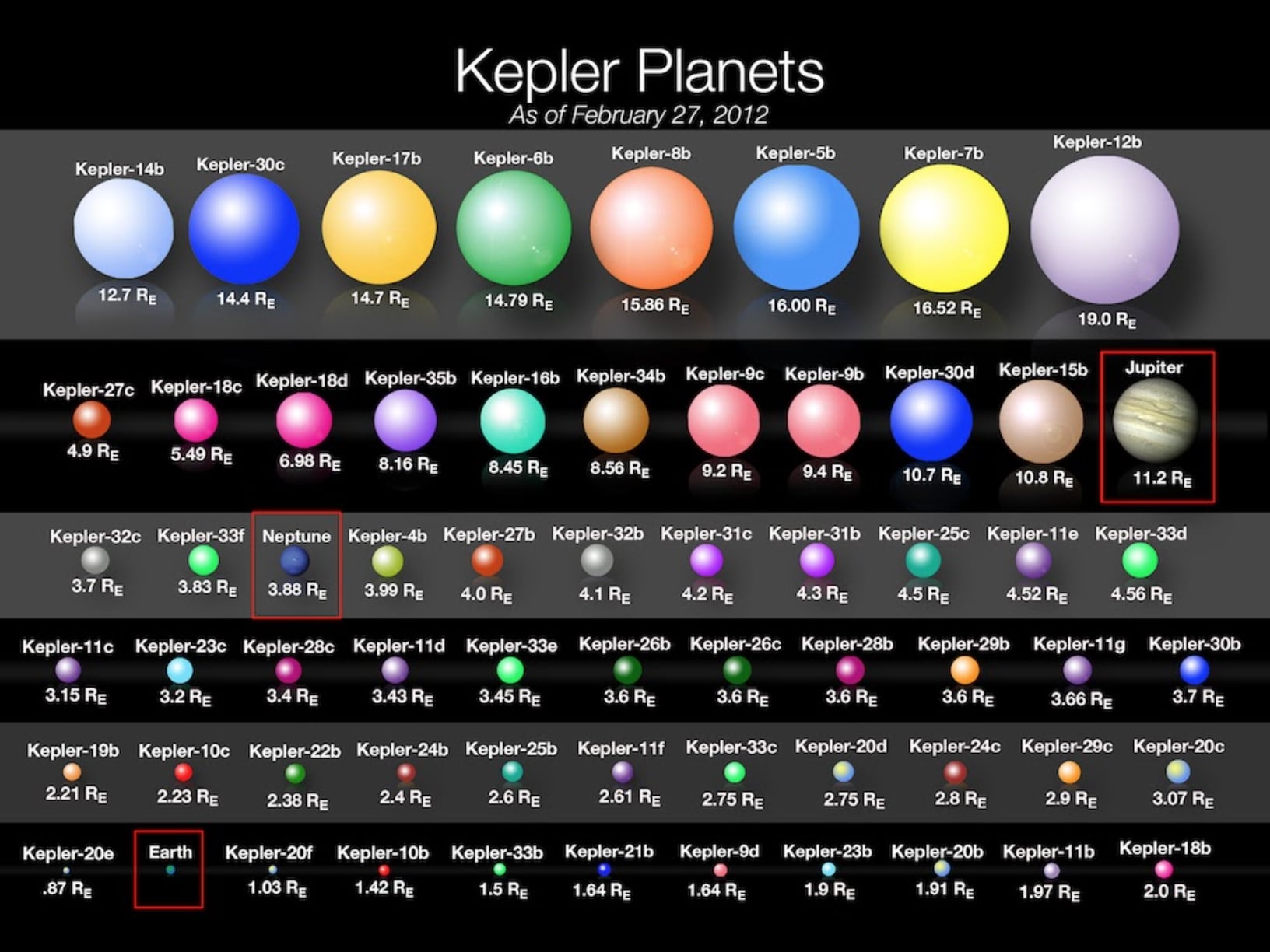
Since it was launched in 2009 with the purpose of identifying new planets, the Kepler telescope [/] has observed 530,506 stars and detected 2,662 planets.
Photograph: NASA/Kepler mission/Wendy Stenzel via arstechnica [/]
David: The main aim here is to determine whether there is life on other planets?
Martin: Yes, the exciting thing about this is that it opens up the motivation for studying exobiology, and asking the question: how did life begin on the earth? We still don’t understand this, and if we did, we would be better able to understand how likely it is to have emerged elsewhere. And vice versa: if we detected something on another planet, we would want to know whether it is the same DNA and RNA, or something quite different. And researchers may be able to tell us whether life always depends on water. What if we found there to be methane-based life on Titan, for instance?
It is important to see human life in a very long timespan. Astronomy has gone back before Darwin, as it were. Darwinian evolution, in outline at least, is basically understood, but Darwin started off with a young earth which already had a stunningly complicated geology. Astronomy looks back further to the birth of the sun, to the generation of the elements and the atoms that made the sun, and right back to some mysterious beginning 13.8 billion years ago. This is a new story which we could not tell fifty years ago.
But I should emphasise that the origin of life – the transition from complex chemistry to the first metabolising reproducing systems – is still a mystery. Until recently this was a subject in the ‘too difficult for science’ box, but now serious people are working on it, motivated by advances in what they can do experimentally. And also by the fact that we’d like to know more about the origins of life, because we’ve got all these places we can now observe where it might have started.
Jane: It is remarkable that the study of the origins of human life on earth, which means focusing on the very small, and the study of the farthest reaches of the universe, the very large, are so connected. A common reaction to the findings of modern cosmology is that they make us human beings feel insignificant, dwarfed by the sheer vastness of it all. But you are saying just the opposite: that they point to the uniqueness and dignity of life on earth.
Martin: Yes. And whilst most people would bet that there is some life which has emerged elsewhere, it is certainly logically possible that there is no life except on the Earth, even in our galaxy. That would make the destruction of life on Earth not merely a terrestrial disaster but a cosmic disaster.
David: There’s a current upsurge of interest in space exploration – particularly the possibility of us going to Mars. This is of course an exciting development, which would represent a huge advance. But could it also be rather a negative thing, because it gives people a get-out clause for the continuation of the human species?
Martin: The idea that we can escape to Mars to avoid the world’s problems is a dangerous delusion fostered by Elon Musk and my late colleague Stephen Hawking. It’s dangerous because terraforming Mars is far harder than dealing with climate change. There’s nowhere in our solar system which is as comfortable to live as the top of Everest or the South Pole or the bottom of the ocean. And we don’t even want to live in these places. I think the idea of mass emigration is crazy. And, of course, we can’t ever get to the other stars as humans – that is for the post-human era.

Stromatolites growing in Shark Bay, Western Australia. The microbial communities living on top of these layered rocks are one of the earth’s most ancient life forms, going back three billion years. They are now being examined by astrobiologists in search of clues about the inception of life. For more, click here [/]. Photograph: Paul Harrison via Wikimedia Commons
The Limits of Our Knowledge
.
David: What was there before the Big Bang, and why did it happen?
Martin: We don’t know. And we don’t know to what extent it’s a proper question. It could turn out to be a question like: ‘what happens if you go north from the North Pole?’ – a model where the question evaporates.
David: By looking at the very large and the very small, will we ever know?
Martin: I would hope so, yes, but the problem is that at the moment we don’t have a unified theory of physics. In many ways we get on very well without one because there is no overlap in the domains of relevance of quantum theory and of Einstein’s Theory of Relativity. Quantum effects are only important in the micro-world where you can neglect gravity. And gravity is important for the orbits of planets and things, but you can neglect quantum fuzziness in those areas.
But if you extrapolate right back to the beginning, then of course, everything is squeezed so densely that quantum fluctuations could shake entire galaxies. Indeed, there is a very serious idea that the fluctuations which led to galaxies did indeed arise from quantum effects at that stage. That’s a very exciting and very compelling speculation, but it’s dependent on physics of a kind which we haven’t directly tested. What we need is a theory that applies to these extreme conditions but which we can test or validate because it predicts things we can test. For instance, if a theory predicted exactly the strength of gravity and exactly the masses of all the particles or something similar, we’d know there was something in it, and then we would take seriously its predictions even when we couldn’t test them. But we’re not at that stage yet.
David: Which theory is closest to this?
Martin: There are actually lots, but the best known one is what is called Super String Theory. This is a very elaborate theory which has many, many variants. It has some very attractive features, but it also has another interesting consequence. It’s very mathematical, and it could be that the mathematics is too hard for anyone to do. There is actually no reason to think that the human brain is capable of fully understanding the deep aspects of reality. We’ve come a long way, and computers and AI can help us, but there may be levels which human brains just can’t encompass. And since, as I have already said, we are far from being the culmination of evolution, we should not be surprised by this; nor should we be too frustrated if there are things that always remain mysteries.
Jane: In your book, you rather emphasise the fact that there are lots of things that we don’t know, and you use it as an argument for tolerance and open-mindedness. How can we be dogmatic about things like creation or the purpose of life when we clearly don’t have the whole picture? You talk also about ‘unknown unknowns’ – things that we don’t even know are there at the moment.
Martin: There is no reason to believe that we have reached the limit of knowledge. The frontiers of science at the moment have a periphery, and just beyond the periphery are the questions we are now posing. The questions posed 50 years ago have mainly been solved, but now the frontiers have moved. We are nowhere near the limits to what human brains can do, but nonetheless, we have to accept that there may be questions which are forever beyond us.
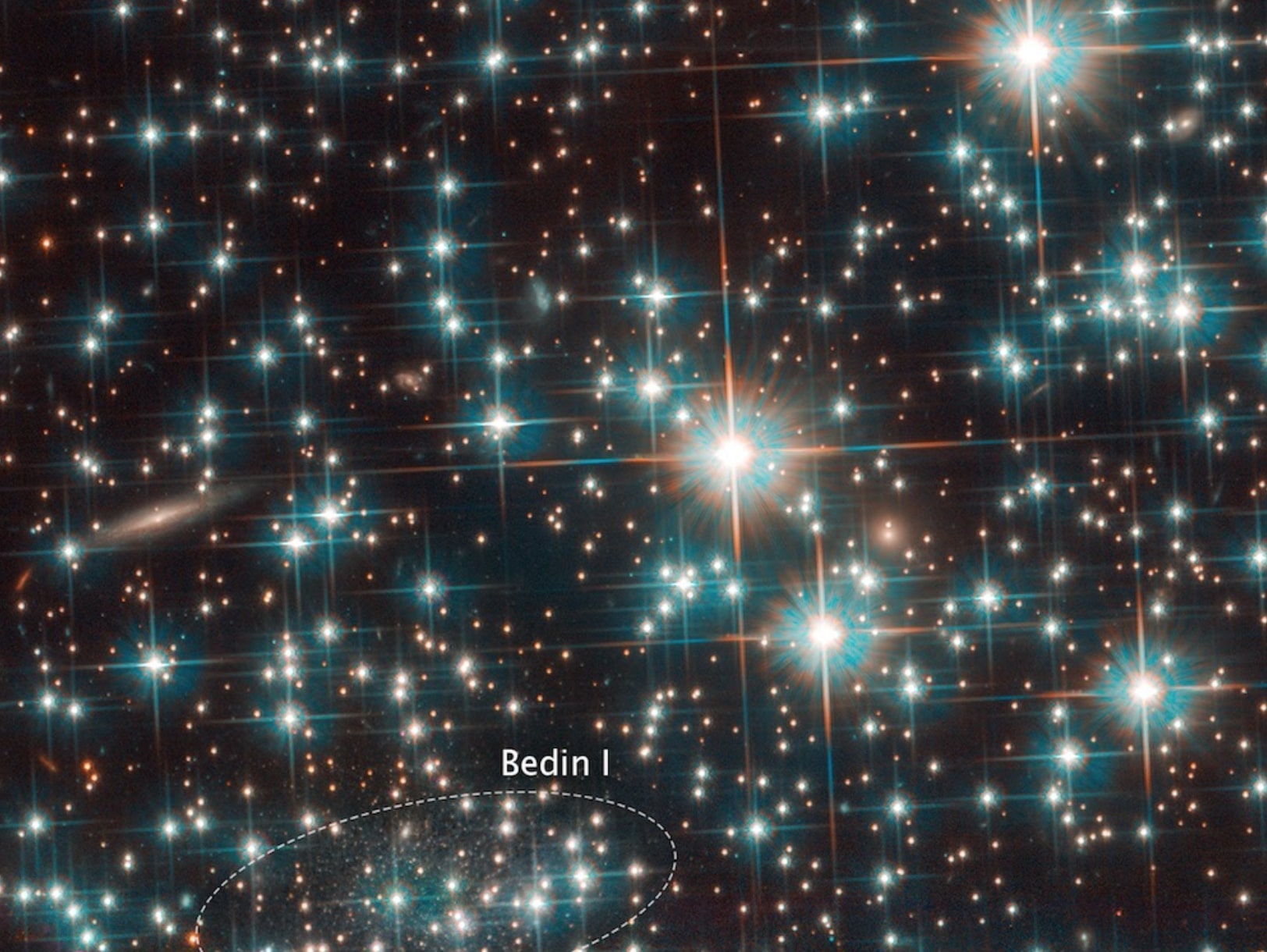
Image from the Hubble Telescope, 31 January 2019, showing stars in the globular cluster NG 6752. Circled at the bottom is a new discovery, a small galaxy named Bedin 1. This is very faint, causing it to be classified as a dwarf spheroidal galaxy which is as old as the universe. Photograph: NASA
Image Sources (click to close)
Banner: Visualisation of the GPM Core Observatory satellite orbiting the earth. The GPM (Global Precipitation Measurement) mission is an international partnership co-led by NASA and the Japan Aerospace Exploration Agency (JAXA) to provide next-generation observation of global rainfall, snow and ice in order to monitor and better understand our climate. Photograph: Britt Griswold/NASA
Inset: Lord Martin Rees. Photograph: courtesy Lord Martin Rees
Other Sources (click to open)
[1] MARTIN REES, Our Cosmic Habitat (Princeton Science Library, new edition 2017)
[2] MARTIN REES, On the Future Prospects for Humanity (Princeton University Press, 2018)
[3] POPE FRANCIS, On Care for Our Common Home: The Encyclical Letter Laudato Si’ (Paulist Press, 2015)
Email this page to a friend
FOLLOW AND LIKE US
——————————————
——————————————
——————————————
FOLLOW AND LIKE US
If you enjoyed reading this article
Please leave a comment below.
Please also consider making a donation to support the work of Beshara Magazine. The magazine relies entirely on voluntary support. Donations received through this website go towards editorial expenses, eg. image rights, travel expenses, and website maintenance and development costs.
READ MORE IN BESHARA MAGAZINE
A Thing of Beauty: Earthrise
Jane Clark contemplates an iconic image which changed our perspective on the world
The Century of Complexity
Vasileo Basilov on the new physics which is transforming our view of causality
Infinite Potenial: The Life & Ideas of David Bohm
Paul Howard talks about his film on the holistic vision of a remarkable physicist/philosopher

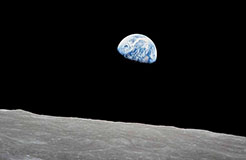


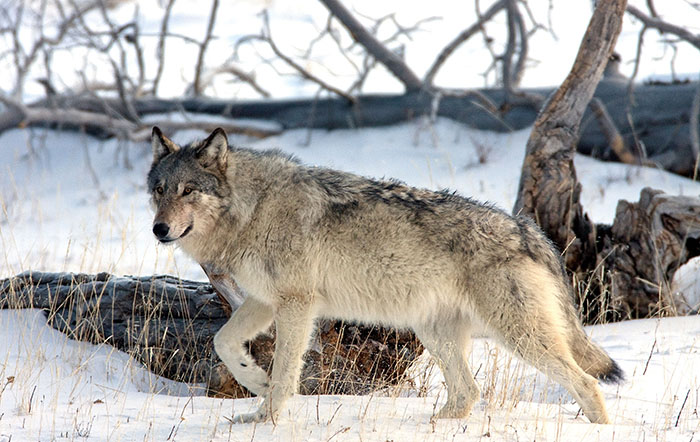
READERS’ COMMENTS
0 Comments